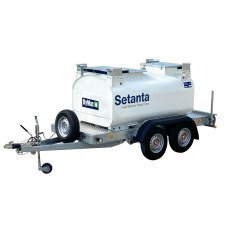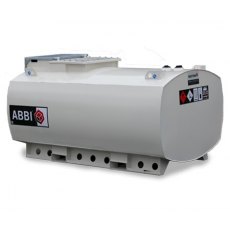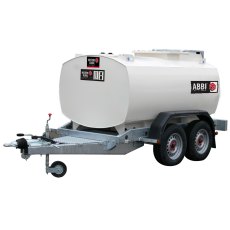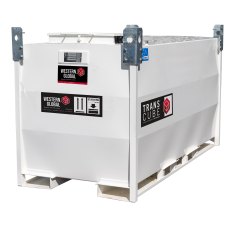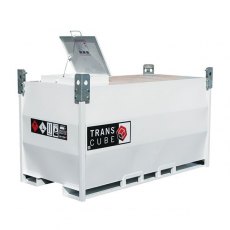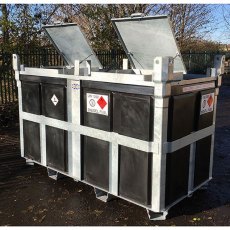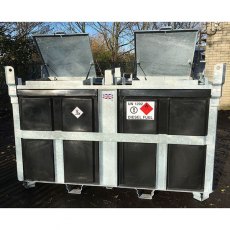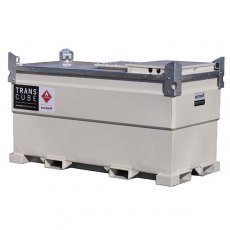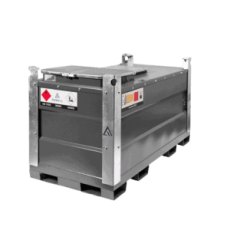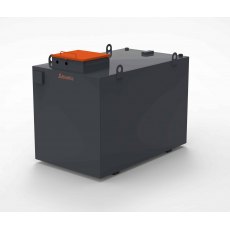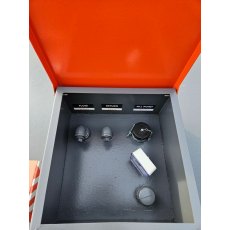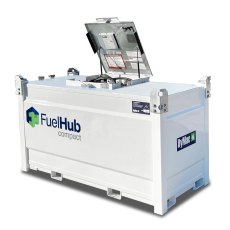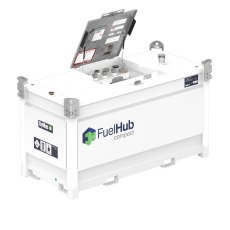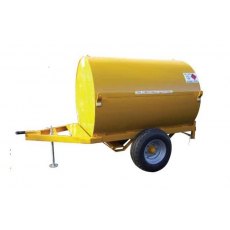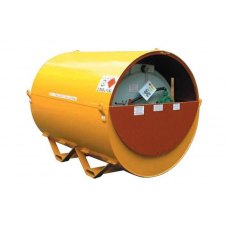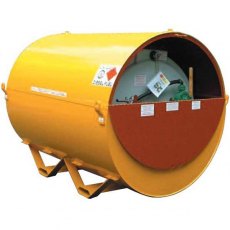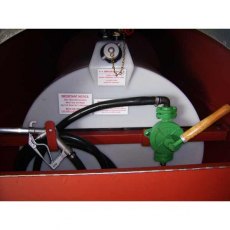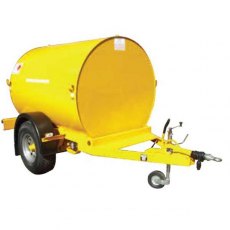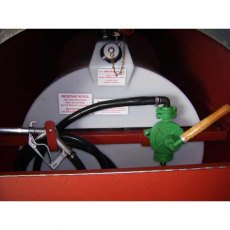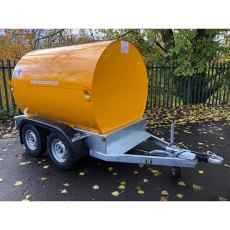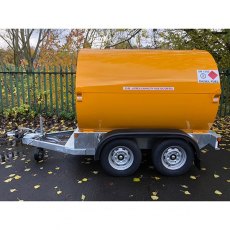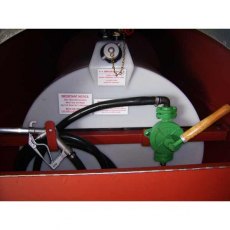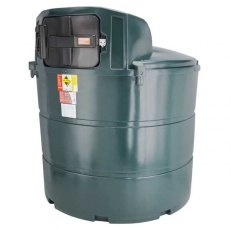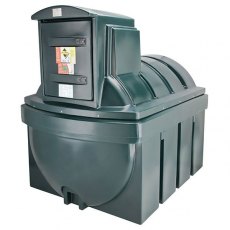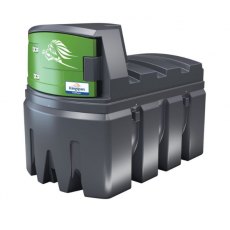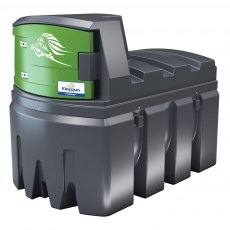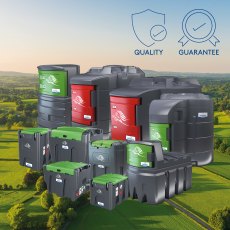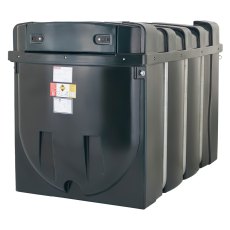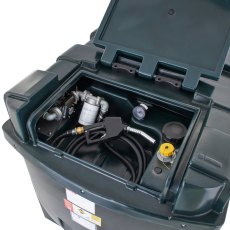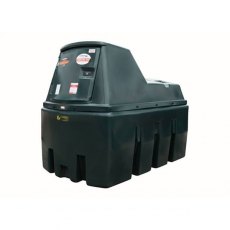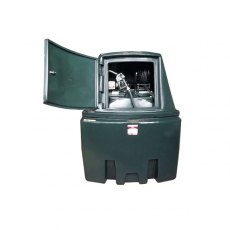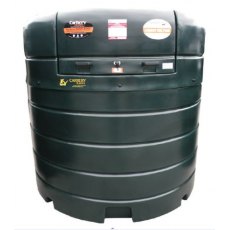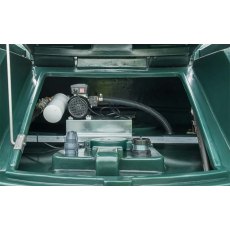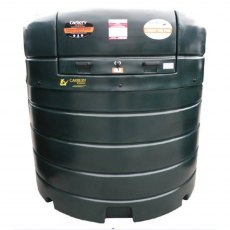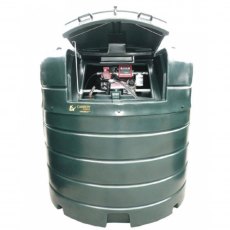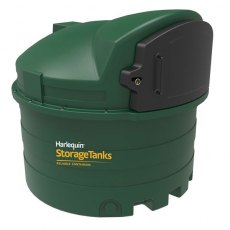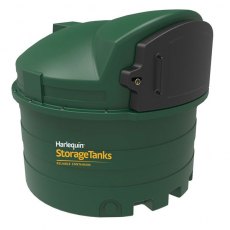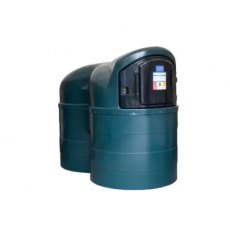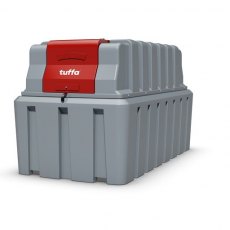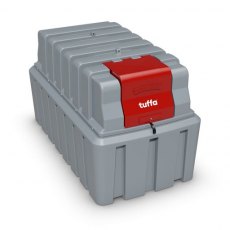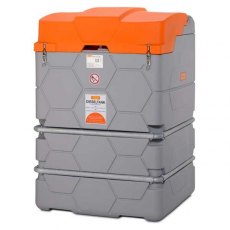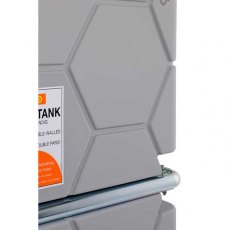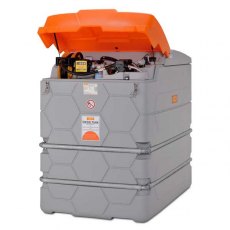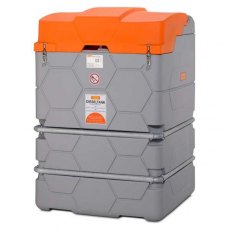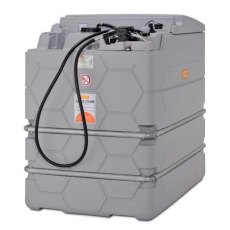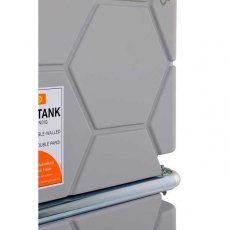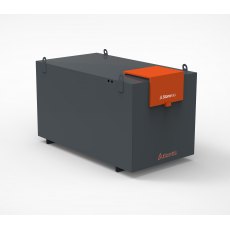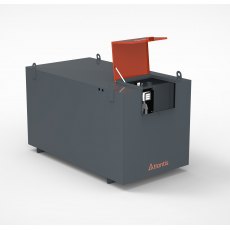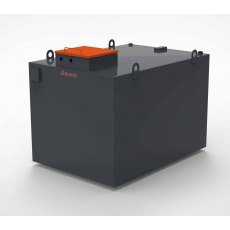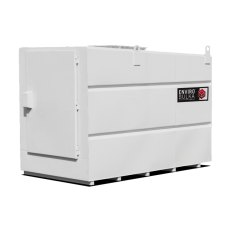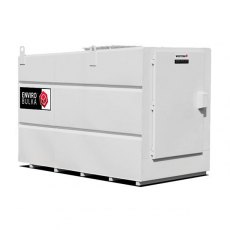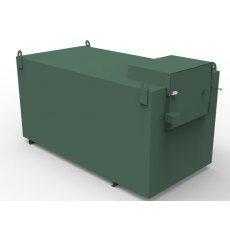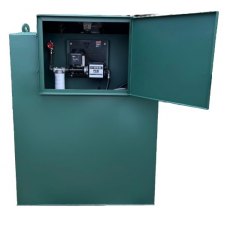Featured Products
(£3,097.20 inc VAT)
(£1,968.00 inc VAT)
(£2,434.80 inc VAT)
2500 Litre Diesel FAQs
Are plastic diesel tanks better than steel diesel tanks?
Longevity and security are among the main reasons to select steel over plastic. That is not to say that a plastic tank will not last or hold up to opportunists trying to get at your valuable commodity however, but good points to consider. Also, steel are more resistant to outside forces. Read our complete guide of steel vs plastic tanks here.
Can I store diesel in a transportable tank ?
A transportable diesel tank should be stored in a secondary containment area if it contains fuel as in most cases these are single skin.
These tanks are primarily designed for transporting fuel to a place of work to be completely discharged of fuel
What type of plastic is used for diesel tanks?
At Fuel Tank Shop, our diesel storage tanks are commonly manufactured from high-density polyethylene (HDPE) or cross-linked polyethylene (XLPE) due to their excellent chemical resistance and durability. These types of plastics are specifically chosen for their ability to withstand the corrosive nature of diesel fuel and provide a reliable storage solution. High-density polyethylene is known for its strength, impact resistance, and flexibility, making it a suitable material for manufacturing diesel tanks that can endure various conditions. Cross-linked polyethylene, on the other hand, offers enhanced resistance to temperature extremes and improved structural stability. This makes XLPE an excellent choice for diesel tanks exposed to fluctuating environmental conditions, ensuring they remain robust and reliable over time. Both HDPE and XLPE contribute to the overall longevity of the diesel tank by preventing degradation and maintaining their structural integrity.
These plastic materials are often moulded using rotational moulding or blow moulding techniques. Rotational moulding creates a one-piece tank without seams or joints, minimising the risk of leaks and ensuring a solid, durable container for diesel storage. The plastic used for diesel tanks is formulated with additives to provide protection against ultraviolet (UV) radiation, which is crucial, especially for outdoor tanks, as it prevents the material from becoming brittle and degrading when exposed to sunlight.
Do plastic diesel tanks deteriorate over time?
Yes, plastic diesel tanks can experience deterioration over time, but the extent of this degradation depends on various factors such as the quality of the tank’s material, environmental conditions, and maintenance practices. Polyethylene, commonly used in plastic diesel tanks, is known for its durability and resistance to corrosion. However, exposure to certain environmental elements, such as prolonged sunlight or extreme temperatures, can contribute to the gradual breakdown of the plastic.
UV radiation is one of the primary culprits for the deterioration of plastic tanks. Over time, sunlight can cause the material to become brittle and lose its structural integrity. To mitigate this, many of our plastic diesel tanks are manufactured with UV-resistant additives to prolong their lifespan. Regular inspection and application of UV protectants, if necessary, can further safeguard the tank against these environmental effects.
Environmental conditions, such as fluctuations in temperature and exposure to harsh chemicals, can also impact the longevity of plastic diesel tanks. Extreme temperature variations may lead to expansion and contraction, potentially causing stress on the tank walls. Additionally, contact with certain chemicals or fuels other than diesel may accelerate the deterioration process. Choosing a tank designed for compatibility with diesel fuel and adhering to proper usage guidelines can help mitigate these risks.
Routine maintenance plays a crucial role in preventing and addressing deterioration. Regular inspections for signs of cracks, leaks, or changes in the tank's structural integrity are essential. It's important to follow manufacturer recommendations for maintenance of our diesel tanks and address any issues promptly, such as applying sealants or replacing damaged components.
How long does diesel last in a transfer tank?
The answer to this question depends on several factors, including the quality of the diesel, the environment the tank is stored in, and the type of transfer tank being used. Generally speaking, diesel fuel stored in a transfer tank will last between six and twelve months. However, this time frame can vary depending on the factors listed previously. For example, if the diesel is of high quality and stored in an environment that is not prone to extreme climate changes, then the diesel may last up to twelve months. However, if the diesel is of lower quality and stored in a harsh environment, then it may only last for six months. Additionally, if the tank is not properly sealed, then the diesel may not last as long, as air can contaminate the fuel and cause it to deteriorate more quickly.
When it comes to selecting the right type of transfer tank for your diesel storage needs, we have several options available. Each type of tank will have its own pros and cons, and the best option for you will depend on your unique needs and budget. If you’d like any help choosing the right diesel transfer tank, contact our friendly team who will be happy to help.
How long can diesel be stored in a steel tank?
Storing diesel in a steel tank offers durability and longevity, but the duration for which diesel can be stored depends on several factors. Generally, diesel can be stored in a well-maintained steel tank for an extended period, often up to 12 months or more, without significant degradation. However, the key to preserving the fuel quality lies in proper storage conditions, preventive measures, and regular maintenance of the tank.
One critical factor affecting diesel storage in a steel tank is the prevention of water contamination. Moisture can promote microbial growth and lead to fuel degradation. Well-designed steel tanks often incorporate features to minimise water ingress, such as effective sealing and proper tank positioning to avoid condensation. Periodic inspections for water accumulation and the use of water-absorbing filters contribute to maintaining fuel quality over time. Implementing protective coatings on the tank interior and exterior, such as epoxy or specialised anti-corrosion treatments, helps mitigate the impact of corrosive elements. Regular inspections to detect and address any signs of corrosion are essential for ensuring the structural integrity of the tank and preserving the quality of the stored diesel. Lower temperatures help slow down oxidation and microbial growth, contributing to the preservation of fuel quality. Adequate ventilation and insulation of the storage area can assist in maintaining a consistent temperature within the steel tank, reducing the risk of temperature-related degradation.
To maximise the duration for which diesel can be stored in a steel tank, it's crucial to adhere to recommended storage guidelines, conduct routine inspections, and implement preventive measures. By maintaining proper storage conditions, you can extend the storage life of diesel in a steel tank and ensure a reliable and consistent fuel supply when needed.
Can I have a flow meter on my diesel tank if fitted with a hand pump or if gravity fed ?
No. Unfortunately the pressure required to enable the flow meter to read accurately is not at a tolerance that the flow meter can record
Why can't I have an automatic shut off nozzle on my diesel tank if fitted with a hand pump or if gravity fed ?
Unfortunately the automatic nozzle requires a pressure of the fuel being pumped to operate the shut off mechanism.
A hand pump or gravity fed tank would not have the necessary pressure to enable this
What is the new legislation for the change of rules for red diesel ?
The red diesel rebate has been a hot topic amongst many industries over the last year. However, after careful consideration earlier this year, the Chancellor and the government have decided to proceed with abolishing the use of red diesel from the 1st April 2022 in a number of sectors, to help reduce the impact that fossil fuels have on the planet. Specifically, their aim is to reduce commercial use of red diesel, especially in the plant and construction sectors, and to encourage the use of other fuels such as white diesel or alternative greener options. So how some industries will be affected and what do they need to know to prepare for the new legislation?
Restrictions on the use of red diesel come into force on 1st April 2022 for a range of industries including plant, construction, leisure, mining, quarrying, road maintenance and logistics. This means that there are less than 5 months to get ready to make sure that you comply with the new regulations from April. So here are a few things that you need to know:
- From 1 April 2022, Registered Dealers in Controlled Oils will need to flush their tanks and supply lines when switching a fuel tank from red to white diesel, so there is no trace of the rebated fuel.
- End users that are losing their red diesel entitlement will need to make sure that they run down their existing stocks and do not purchase red diesel from 1 April 2022.
- The government has recognized that some users such as data centres are holding large amounts of red diesel but may only use it for a few hours a year in case of emergency. So it has been decided that HMRC will investigate and decide if the user can provide enough evidence that they have not built up their stocks or taken red diesel after the rules changed.
- As the price of red diesel is a lot lower compared to the average price of white diesel, users will see an increase in how much they spend on fuel
- As white diesel is so much more expensive and also widely used by the public, it needs to be considered that a rise in fuel thefts may occur once the switch has been made, meaning those storing fuel on-site need to consider protecting their fuel, as well as controlling and monitoring its use amongst staff
Transport/Fleet and Plant Hire
These industries will no longer be able to fuel their vehicles on-site using red diesel, they must make the switch over to an alternative fuel. This will involve running down or removing red diesel from vehicles, machinery and/or fuel storage tanks. There’s a possibility that they will be able to sell back any excess stock of red diesel to fuel suppliers which will help towards funding the cost of replacing the fuel.
The cost of refuelling vehicles and machinery, or filling up storage tanks, will see an increase due to the difference in price between red diesel and alternative fuels such as white diesel. This will happen regardless of whether refuelling at a public petrol station or on-site using their own storage and dispensing equipment. One of the most important things that these industries need to consider is securing their site, any fuel storage tanks, and the vehicles or machinery such as diesel-powered chiller units on trucks, forklift trucks and mobile generators, to protect against theft, as well as unauthorized fuel dispensing
2. Engineers
As more industries will switch over from red diesel to alternative fuels, engineers will see an increase in jobs relating to fuel security and fuel management systems being required on-site or at business premises. This may require extra labour to implement these changes (depending on the size of the team), and extra training on products and installation (depending on the type of equipment being installed). Furthermore, it’s likely that you’ll also see an increase in call out jobs to assist with breakdowns, maintenance and further installs or changes to equipment.
3. Fuel Suppliers
The increase in demand for white diesel and other alternative fuels that are more expensive might result in more customers contacting fuel suppliers about fuel security options and to find more information on how they can manage the fuel usage on their site. We believe that as industries are starting to switch over fuel suppliers may see a surge in enquiries for fuel management systems, gauging, fuel monitoring and security solutions. So, our technical and sales team will be on hand to support fuel suppliers offering expert product selection advice and helping their customers to find the right products that match their applications and requirements
With thanks to our supplier Centre Tank Services Limited
How secure are the diesel dispensing tanks ?
All the diesel dispensing tanks that we sell are bunded which is a term that literally means a `tank within a tank'. This is designed to keep the fuel safe in the very rare event should the inner tank split. The cabinet doors can be locked either with a key or in some instances the tank is supplied with a metal post which the customer can secure with their own padlock
Advanced diesel dispensing tanks can sometimes be offered or come with fuel management systems which would only allow authorized people with key fobs to dispense fuel
Can we install a diesel dispensing tank ?
No. We are not able to install a diesel dispensing tank but there are companies out there that are able to install, service & decommission old tanks. Please contact us for details
Does diesel react with galvanised steel?
Yes, diesel fuel can react with galvanised steel under certain conditions, posing potential issues with fuel quality and storage equipment. Galvanised steel is coated with a layer of zinc to protect it from corrosion, but diesel fuel, particularly ultra-low sulphur diesel (ULSD), contains compounds that can react with the zinc coating. Over time, this reaction may result in the formation of sediments or precipitates in the fuel, potentially leading to filter clogging and fuel system problems.
The reaction between diesel and galvanised steel is more likely to occur in the presence of water or moisture. If water is introduced into the fuel tank, it can accelerate the corrosion of the zinc coating, releasing zinc ions into the diesel fuel. These ions can then react with other components in the fuel, forming insoluble compounds that can contribute to filter plugging and compromise the efficiency of the fuel system.
To minimise the risk of diesel reacting with galvanised steel, it is advisable to prevent water ingress into the fuel storage system. Regularly inspect the tank for signs of water accumulation, ensure proper tank sealing, and consider installing water-absorbing filters to remove any moisture from the fuel. Additionally, using fuel additives designed to stabilise and improve the quality of stored diesel can help mitigate potential reactions with the galvanised steel. It's essential to follow best practices for fuel storage and maintenance, including routine inspections, to identify and address any signs of corrosion or degradation in the storage tank.
Do you sell gravity feed kits for the delivery of diesel fuel?
No, as an environmentally responsible supplier we do not supply these kits, due to the high risk of accidental damage / discharge associated with their use. Additionally, at many installations today their continued use is illegal. If you require a tank to store diesel fuel for vehicular use, we would advise you consider a Harlequin Fuel Station, or Fuel Point For BioDiesel applications, Harlequin BioFuel Stations are recommended for BioDiesel blends of up to B100. Alternatively, for connection to remote pedestal type dispensing units, Harlequin's BioBund range is ideal. Please note that all BioDiesel tanks supplied by Tanks.ie are suitable only for use with BioDiesel produced in accordance with European Standards.
What are the power requirements for mains powered diesel dispensing tanks ?
A single phase (domestic 240v mains) power supply is required and always recommended being connected to a Residual Current Device (RCD) fitted at the connection point to the power supply. All mains electrical installations must only be undertaken by a qualified electrician and must be inspected and tested regularly in accordance with statutory requirements. Alternatively an electrician can wire up to a standard 3 pin plug and would not affect warranty.
What liquids are diesel dispensing tanks suitable for storing and dispensing?
Diesel (D) to British Standard BS2869. Additionally, the diesel dispensing tanks we sell are also suitable for the storage and dispensing of Bio-Diesel with a bio-element of up to 5% concentration.
Can I store and dispense Kerosene (C1/C2) from a diesel dispensing tank ?
No. The pumps and ancillary equipment fitted to these products are suitable only for use with Diesel. Dispensing a non-approved fuel from this equipment could result in serious injury or death.
Are the flow meters fitted (if fitted as standard or as an upgrade) to diesel dispensing tanks suitable for the resale of fuel?
No. Any equipment that is required to be sold would require a Weights & Measures certificate. All the diesel dispensing tanks we sell do not have certified equipment
Are batteries supplied as standard with 12v equipped pumps on the diesel dispensing tanks ?
No. The 12v pumps would come supplied with battery cables and crocodile clips to connect to a battery outside of the tank. We are unable to provide batteries.
Are diesel dispensing tanks suitable for dispensing 'Adblue'?
No. These tanks would not have the correct type of pump and AdBlue solution requires stainless steel connectors which are not used in diesel tanks
Does the tank require any assembly after delivery ?
No. The diesel dispensing tanks that we sell, excluding the CEMO UNI & MULTI tank range, are assembled at the factory. Once delivered, the customer simply positions the tank, connects to the electrical supply and fill with diesel and the tank is ready to use

 Login
Login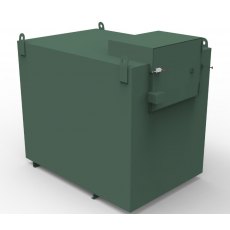
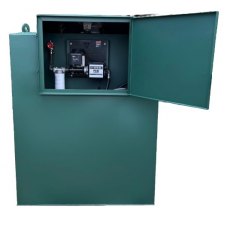


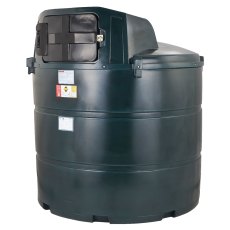
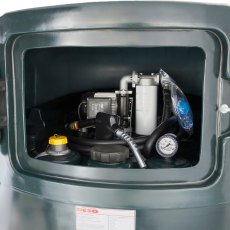
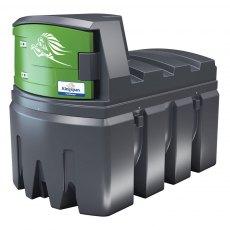
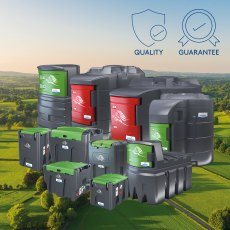
.png)






